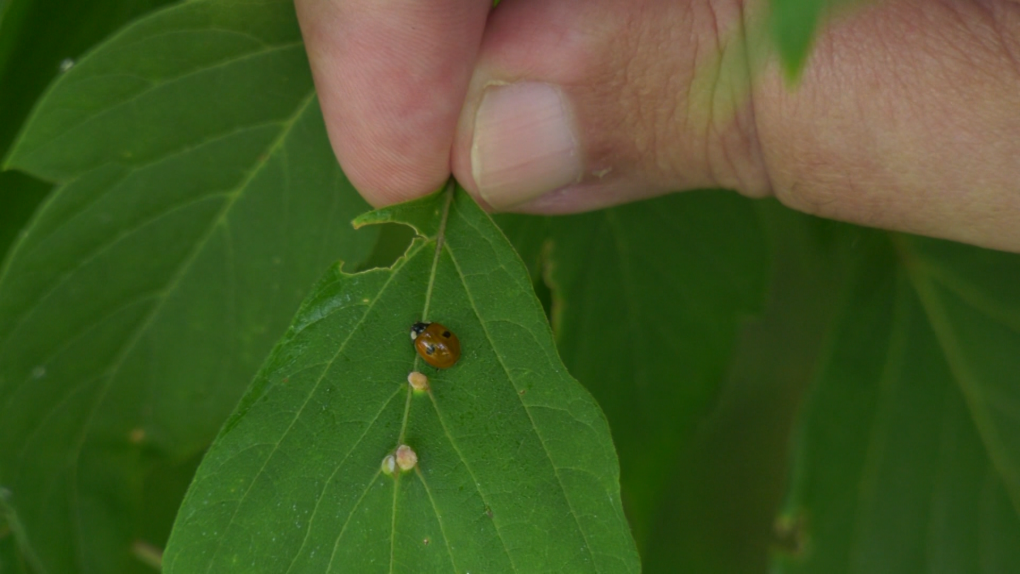'They just go ham': How a small insect is leaving a big mess in some Edmonton neighbourhoods
If you've wondered what that sticky stuff all over your car and sidewalk is, it's all thanks to a tiny insect who leaves a big mess.
Aphids feed on the sap from trees and other plants, and the by-product of that has recently left some Edmonton neighbourhoods feeling a little tacky.
"Their excrement is what we call honeydew," arborist Felix Reichel said. "When there's a really large population, they just go ham and everything gets sticky."
Streets with older trees, like elms, are more likely to see large aphid populations. While the insects are more active in the spring, Reichel said the recent heat is helping the population boom.
 A car can be seen covered in sticky honeydew, excreted by aphids, in Westmount on July 10, 2024. (Miriam Valdes-Carletti/CTV News Edmonton)That's thanks to a prolific reproduction rate, said Mike Jenkins, a senior scientist with the City of Edmonton.
A car can be seen covered in sticky honeydew, excreted by aphids, in Westmount on July 10, 2024. (Miriam Valdes-Carletti/CTV News Edmonton)That's thanks to a prolific reproduction rate, said Mike Jenkins, a senior scientist with the City of Edmonton.
"They give birth to clones of themselves, and those clones are actually already pregnant with their own clones," he said. "And they can give birth every couple of days, so they can have 40 to 50 generations in a season."
Jenkins said the city of Edmonton typically doesn't treat for aphids, due in part to their rapid reproduction, as well as the impacts on the wider ecosystem.
"An insecticide is likely to take out a number of their natural enemies as well," he added. "And the aphids can reproduce much more quickly than the predators can come back."
 A ladybird beetle (also known as a ladybug), a natural predator of aphids, can be seen on a leaf in Westmount on July 10, 2024. (Miriam Valdes-Carletti/CTV News Edmonton)Healthy trees are not generally at risk from aphid activity, but Jenkins said little green bugs can stress or damage smaller garden plants in large numbers.
A ladybird beetle (also known as a ladybug), a natural predator of aphids, can be seen on a leaf in Westmount on July 10, 2024. (Miriam Valdes-Carletti/CTV News Edmonton)Healthy trees are not generally at risk from aphid activity, but Jenkins said little green bugs can stress or damage smaller garden plants in large numbers.
To keep them under control, Jenkins and Reichel recommend releasing a few ladybirds – a main predator for aphids – or spraying plants down with water to knock the aphids off.
As for the honeydew, it's harmless to humans, so the best strategy is to hit the car wash.
"In terms of aphids and trees, (they're) usually not really considered a pest except for the amount of honeydew that they're producing," Jenkins said. "Soap and water is the best way to clear that."
With files from CTV News Edmonton's Miriam Valdes-Carletti
CTVNews.ca Top Stories

Prime Minister Trudeau meets Donald Trump at Mar-a-Lago
Prime Minister Justin Trudeau landed in West Palm Beach, Fla., on Friday evening to meet with U.S.-president elect Donald Trump at Mar-a-Lago, sources confirm to CTV News.
'Mayday! Mayday! Mayday!': Details emerge in Boeing 737 incident at Montreal airport
New details suggest that there were communication issues between the pilots of a charter flight and the control tower at Montreal's Mirabel airport when a Boeing 737 made an emergency landing on Wednesday.
Hit man offered $100,000 to kill Montreal crime reporter covering his trial
Political leaders and press freedom groups on Friday were left shell-shocked after Montreal news outlet La Presse revealed that a hit man had offered $100,000 to have one of its crime reporters assassinated.
Questrade lays off undisclosed number of employees
Questrade Financial Group Inc. says it has laid off an undisclosed number of employees to better fit its business strategy.
Cucumbers sold in Ontario, other provinces recalled over possible salmonella contamination
A U.S. company is recalling cucumbers sold in Ontario and other Canadian provinces due to possible salmonella contamination.
Billboard apologizes to Taylor Swift for video snafu
Billboard put together a video of some of Swift's achievements and used a clip from Kanye West's music video for the song 'Famous.'
Musk joins Trump and family for Thanksgiving at Mar-a-Lago
Elon Musk had a seat at the family table for Thanksgiving dinner at Mar-a-Lago, joining President-elect Donald Trump, Melania Trump and their 18-year-old son.
John Herdman resigns as head coach of Toronto FC
John Herdman, embroiled in the drone-spying scandal that has dogged Canada Soccer, has resigned as coach of Toronto FC.
Weekend weather: Parts of Canada could see up to 50 centimetres of snow, wind chills of -40
Winter is less than a month away, but parts of Canada are already projected to see winter-like weather.


































